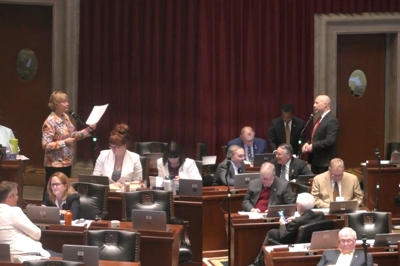
In a split screen, Rep. Deb Lavender, D-Kirkwood, and Rep. Cody Smith, R-Carthage, are seen debating the state budget a late House session on Tuesday, April 2, 2024.
JEFFERSON CITY ŌĆö The Missouri House began signing off on major parts of the state budget Tuesday, with the aim of getting the $50 billion spending package to the Senate by weekŌĆÖs end.
Led by House Budget Committee Chairman Cody Smith, R-Carthage, Republicans who control the chamber rejected most attempts by Democrats to boost funding for a variety of programs, ranging from child care to adult education.
Rep. Peter Merideth, D-51║┌┴Ž, for example, was turned back in an attempt to add a permanent funding stream for school breakfast and lunch programs.
ŌĆ£WeŌĆÖre paying for food for kids at school. LetŌĆÖs plan on keeping that going,ŌĆØ Merideth said.
But Smith said he couldnŌĆÖt commit to the idea because of uncertainty about money coming from the federal government.
ŌĆ£These are federal dollars and I donŌĆÖt think we have a guarantee of them coming next year,ŌĆØ Smith said.
People are also reading…
There were some exceptions. Rep. Del Taylor, D-51║┌┴Ž, won support for an amendment granting an extra $300,000 to urban agriculture programs.
Despite launching budget hearings in December ŌĆö a month earlier than usual ŌĆö the House action this week leaves the Senate with only five weeks to put its stamp on the spending plan and negotiate differences with the House before a May 10 deadline.
Although state tax revenues are flattening, the state still has a $6 billion surplus that was built up when federal pandemic relief dollars were flowing into the treasury.
Nonetheless, the House version that began moving Tuesday reduces ParsonŌĆÖs proposal by about $2 billion. Among items cut by the House is a nearly $53 million plan to redevelop the mostly abandoned Missouri State Penitentiary in Jefferson City as a tourist site.
The House version also reduces by more than $574 million the amount Parson had sought for the stateŌĆÖs Medicaid program, which provides health insurance to low-income Missourians.
Smith, who is a candidate for state treasurer, said an ongoing project to purge people who no longer qualify for the insurance shows less can be spent because fewer will be receiving the benefit.
The House also reduced ParsonŌĆÖs call for a 3% boost to colleges and universities to a 2% increase.
A late amendment by Smith would add $25 million to build a facility to teach engineering at the University of Missouri-51║┌┴Ž.
After committing major state funds to rebuild and widen Interstate 70 last year, the House plan allocates $727 million to improve Interstate 44. In addition, $100 million will go to repair rural roads across the state.
ŌĆ£Lots of exciting things happening here for our stateŌĆÖs transportation network,ŌĆØ Smith said.
The plan also calls for tapping into the stateŌĆÖs opioid settlement funds to bankroll $20 million worth of studies into psilocybin mushrooms and ibogaine as treatments for mental health disorders.
The state also could see a new state park in southwestern McDonald County, which is represented by House Budget Committee Chairman Dirk Deaton.
Missouri taxpayers also will be on the hook for $8 million for ParsonŌĆÖs decision to send National Guard troops to Texas as part of a Republican-led effort to highlight immigration as an election year issue.
The plan leaves ParsonŌĆÖs budget proposal on teacher pay intact. Base salary for teachers would rise to $40,000, up from the current national low of $25,000. The cost is about $4 million.
Overall, state employees will see a 3.2% salary increase.
Raises also could be coming for workers who work for private agencies that care for disabled Missourians. After raising rates last year to bring the pay level to $16 per hour, the new spending plan aims to bring the pay to $17 per hour.
The chamber is expected to put a final stamp of approval on the package Thursday, giving the Senate its chance to put its imprint on the plan beginning next week.
The legislation is Hous
Missouri's Legislature reflects the federal structure in many ways. Video by Beth O'Malley













